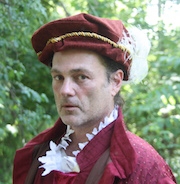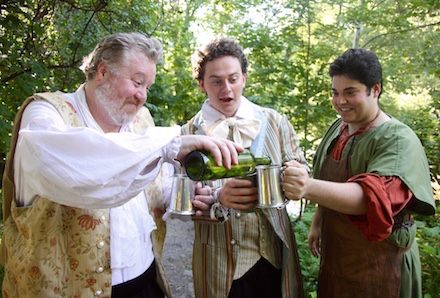Who's Who In Henry VI - Part Two
There are a lot of characters in Shakespeare's history plays, and we know it can be tough to keep them straight. So here's a brief "Who's Who" of some of the key players in the show.
See a family tree for all the main characters here
See Part 1 of our Who's Who here

Richard Plantagenet, the Duke of York, is the leader of the house of York. He is descended directly from the original Duke of York, the fourth son of Edward III. But Richard's father, also named Richard, Earl of Cambridge, was married to the sister of Edmund Mortimer — who was descended from Lionel, Duke of Clarence, the second son of Edward III.
This link by marriage to the Mortimers allows Richard Plantagenet to argue that he has a stronger claim to the throne than Henry VI. Edmund Mortimer was declared the official heir to the throne by Richard II, who had no children. But before Mortimer could inherit, Henry Bolingbroke deposed Richard II and took the throne for himself, becoming Henry IV. Henry passed the crown down to his son, Henry V, and grandson, Henry VI — but they are all descended from the third son of Edward III, John of Gaunt, Duke of Lancaster.
In principle, the York/Mortimer claim tracing back to the second son should be stronger than the Lancaster claim tracing back to the third son. And early in our play, the dying Mortimer names Richard Plantagenet his heir. So why isn't Richard king? In part because his father, Earl of Cambridge, was one of the conspirators against Henry V in that play. They were trying to assassinate Henry V and put Edmund Mortimer on the throne. But their plan was discovered, and the Earl of Cambridge was executed for treason — putting his son, Richard Plantagenet, into disgrace.
At the beginning of Henry VI, Richard has been stripped of his title as Duke of York, and is taunted by the Duke of Somerset as a traitor. Richard works steadily to regain his title and build his power. He fights to regain English territories in France, captures Joan of Arc, and maneuvers behind the scenes until he is ready to make a public claim to the throne — even if it means going to war with the house of Lancaster to get it.
Richard is married to Cecily Neville, Duchess of York and sister to the Earl of Salisbury. He has four sons: Edward, the oldest, George, Richard, and his youngest son, Edmund, the Earl of Rutland.

Edward is the oldest son of Richard Plantagenet, and will eventually take the throne as King Edward IV. Edward is a skilled military commander who leads the York forces to their greatest victories. But he is also impulsive, confident to the point of cockiness, and possessed of strong appetites for wine, women, and the finer things in life. His sudden attraction to the Lady Grey, Elizabeth Woodville, a young widow, leads to an impetuous decision to marry her — breaking his word to Warwick and leading directly to Warwick's betrayal and a new set of wars with the house of Lancaster.

George, who later becomes the Duke of Clarence, is the second son of Richard Plantagenet. George is much more practical than his older brother Edward. When Edward becomes king, George recognizes the importance of seeking a marriage for Edward that will create a strong alliance between the house of York and the King of France. He is therefore shocked at Edward's impulsive decision to marry Elizabeth Woodville. George makes his disapproval clear to Edward — but in the end, when it counts, he stands with his brother and helps to defend Edward's throne.
George is married to the older daughter of the Earl of Warwick and is probably the person closest to his younger brother, Richard.

Richard, who later becomes the Duke of Gloucester, is the third son of Richard Plantagenet. Richard has several physical disabilities: by his own description, he has a withered arm, a hump on his back, and legs of uneven lengths. There are rumors that he was born feet first, with all his teeth, and caused his mother great pain in childbirth.
Richard has not had an easy life. He has been mocked and reviled for his appearance and his disabilities; even his own mother has found it difficult to show him affection. He is very much like his father, however, and has trained himself to be a skilled fighter in spite of his disabilities. He is intelligent and sharp-tongued, prone to sarcasm, a little hot-headed, and eager to fight.
Richard is not married and does not believe he will find a woman that can love him. His resentment of the treatment he has experienced throughout his life and his inability to find enjoyment in worldly pleasures lead him to plot a path to the throne for himself — even if he has to get rid of his own brothers to get there...

The Earl of Warwick, Richard Neville, is one of the most powerful nobles in England. Warwick becomes known as "the Kingmaker" for his ability to win the throne for the candidate he champions.
Warwick is a principled supporter of the house of York, believing that Richard Plantagenet has a stronger claim to the throne than Henry VI. When Richard is killed, Warwick throws his support behind Richard's son, Edward, and sees him crowned as King Edward IV.
To strengthen Edward's hold on the throne, Warwick travels to France to arrange a marriage between Edward and the Lady Bona, sister to the King of France. This marriage would create a strong alliance between the house of York and France, assuring their success and preventing the house of Lancaster from appealing to France for aid. Warwick pledges his honor to the King of France that Edward is the rightful king of England — and is therefore furious when he learns that Edward has gone back on his word and married Elizabeth Woodville. Furious enough to switch sides...

The Earl of Salisbury, also named Richard Neville, is Warwick's father and leader of the powerful Neville family from Northern England. His sister Cecily is married to Richard Plantagenet.
Salisbury's father was Ralph Neville, Earl of Westmorland, a strong supporter of both Henry IV and Henry V. Salisbury, however, like his son, believes that Richard Plantagenet has the stronger claim to the throne, so he supports the house of York against Henry VI and the Lancastrians. He fights and is wounded alongside Richard when the forces of Lancaster lay siege to Richard's castle in York.
Summer 2016:
Twelfth Night
Henry VI: A Tiger's Heart
"The very best summer thing."
— Warren Greenwood, Ithaca Times
This summer, we'll be pairing the next-to-last installment in our history series with one of Shakespeare's richest and best-loved romantic comedies. All performances at Allan H. Treman State Marine Park, on Route 89 behind the Hangar Theatre.
Twelfth Night
July 7, 10, 14, 16, 22, 24 at 6 pm
Tickets on sale now!
An exploration of love in all its forms, the crowning glory of Shakespeare's romantic comedies is a richly layered and endlessly entertaining play. Hilariously funny and deeply romantic, Twelfth Night features: a shipwreck, a clever heroine in disguise, twins that no one can tell apart, multiple cases of mistaken identity, a lovesick count, a lovesick countess, a pair of drunken pranksters, a duel (sort of), a pair of yellow stockings, a pirate, a fool, a madman, a bunch of lovers, a bunch of songs, one of the greatest practical jokes in all of literature, and a whole lot of smiling!
Henry VI: A Tiger's Heart
July 8, 9, 15, 17, 21, 23 at 6 pm
Tickets on sale now!
When Henry V dies and leaves his young son on the throne, the divisions in the kingdom break open and England erupts into civil war. The Wars of the Roses pit the house of Lancaster against the house of York — one led by one of Shakespeare's most formidable women, and the other driven by the ominous rise of the future Richard III.
Drawing on material from all three parts of Shakespeare's Henry VI, this sweeping epic features the first appearance of Richard III, two of Shakespeare's strongest women in Queen Margaret and Joan of Arc, the scene that gave birth to the phrase "the Wars of the Roses," a popular rebellion with the slogan "Let's kill all the lawyers!", and some of the most thrilling and intense conflicts that Shakespeare ever created.
The game of thrones heats up to boiling point in this show, so put it on your calendars now!
Get tickets now!
Ushers are still needed for a number of performances. See one or both summer shows for free! Sign up to be an usher here.
The Ithaca Shakespeare Company · Ithaca, NY 14850 · info@ithacashakespeare.org
